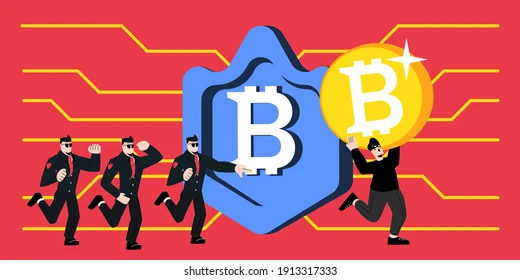How to Protect Your Bitcoin from Hacking or Theft: Essential Tips for Secure Crypto Holdings
In the world of digital assets, Bitcoin stands out as the most popular and valuable cryptocurrency. While owning Bitcoin can be exciting, it comes with its share of risks. The decentralized nature of Bitcoin is one of its strengths, but it also means you are responsible for protecting your holdings from hackers and theft. Cybercriminals are always looking for opportunities to exploit weak security practices. So how can you protect your Bitcoin from these threats?
Here’s a simple guide on how to safeguard your Bitcoin and ensure your investment stays secure:
Use a Hardware Wallet (Cold Storage)
One of the safest ways to store your Bitcoin is using a hardware wallet. These are physical devices that store your private keys offline, which makes it nearly impossible for hackers to access them. Unlike software wallets that are connected to the internet (hot wallets), hardware wallets are not vulnerable to online attacks. Popular hardware wallets like Ledger or Trezor offer high-level encryption, keeping your funds safe even if your computer is compromised.
Enable Two-Factor Authentication (2FA)
Always enable two-factor authentication (2FA) on any exchange or wallet where you store your Bitcoin. 2FA adds an extra layer of security by requiring not only your password but also a code sent to your mobile device. This means even if a hacker gets hold of your password, they would also need access to your phone to log in. Apps like Google Authenticator or Authy are excellent tools to set up 2FA.
Use Strong, Unique Passwords
Creating a strong, unique password for each account is crucial. Avoid using the same password across multiple platforms, as this increases the risk if one account is compromised. Consider using a password manager like LastPass or Bitwarden to generate and store strong passwords. A good password should include a combination of upper and lower-case letters, numbers, and special characters, and it should be at least 12-16 characters long.
Beware of Phishing Scams
Phishing attacks are one of the most common ways hackers steal cryptocurrencies. Be cautious of emails, links, or messages that seem suspicious or ask for your private information. Scammers often disguise themselves as legitimate companies or platforms, tricking users into entering their login details or downloading malware. Always double-check URLs, and never click on links from unverified sources. Bookmark your trusted crypto websites to avoid being misled.
Keep Your Software Updated
Regularly updating your software, whether it’s your wallet, operating system, or antivirus program, is essential. Updates often include security patches that fix vulnerabilities hackers could exploit. For example, if you’re using a desktop or mobile wallet, make sure to keep it up to date. The same goes for your computer and mobile device’s operating system—staying updated minimizes the risk of malware or security breaches.
Backup Your Wallet
If you use a wallet to store your Bitcoin, it’s vital to back it up. Backups protect you from accidental loss due to hardware or software failures. Most wallets allow you to create a seed phrase, which is a sequence of random words that act as a backup for your wallet. If you lose access to your device, you can restore your funds using this seed phrase. Store your backup phrase in a safe, offline location and never share it with anyone.
Avoid Keeping Bitcoin on Exchanges
While cryptocurrency exchanges are convenient for trading, they are also a target for hackers. It’s generally not recommended to store large amounts of Bitcoin on exchanges for long periods. Instead, transfer your coins to a secure wallet as soon as possible. Exchanges have been hacked in the past, and while many have improved their security measures, they remain vulnerable to sophisticated attacks.
Use Multisignature Wallets
A multisignature (multisig) wallet requires more than one private key to authorize a Bitcoin transaction. This means that even if one of your keys is compromised, the hacker still cannot access your funds without the other keys. This setup is especially useful for businesses or individuals who want to add an extra layer of security. Multisig wallets can be set up to require multiple approvals, such as from different devices or people, making unauthorized transactions nearly impossible.
Monitor Your Accounts Regularly
Keeping an eye on your Bitcoin holdings and transaction history is essential. Set up alerts for any unusual activity on your accounts, and check them frequently. If you notice anything out of the ordinary, act quickly to secure your funds. Early detection of unauthorized activity can prevent significant losses.
Stay Informed About Security Threats
The cryptocurrency space is constantly evolving, and so are the threats that come with it. It’s important to stay informed about the latest security risks and best practices for protecting your Bitcoin. Follow reputable sources, participate in online communities, and consider subscribing to newsletters that provide updates on crypto security.
Conclusion: Your Bitcoin, Your Responsibility
When it comes to securing your Bitcoin, the responsibility lies in your hands. By following the steps outlined above, you can significantly reduce the risk of hacking or theft. Whether you’re a seasoned investor or new to the world of crypto, taking these precautions can give you peace of mind that your digital assets are safe.
In the world of crypto, it’s better to be overly cautious than to regret losing your hard-earned Bitcoin to a hacker. Invest in your security, stay vigilant, and remember that there’s no such thing as being too safe when it comes to protecting your Bitcoin!

